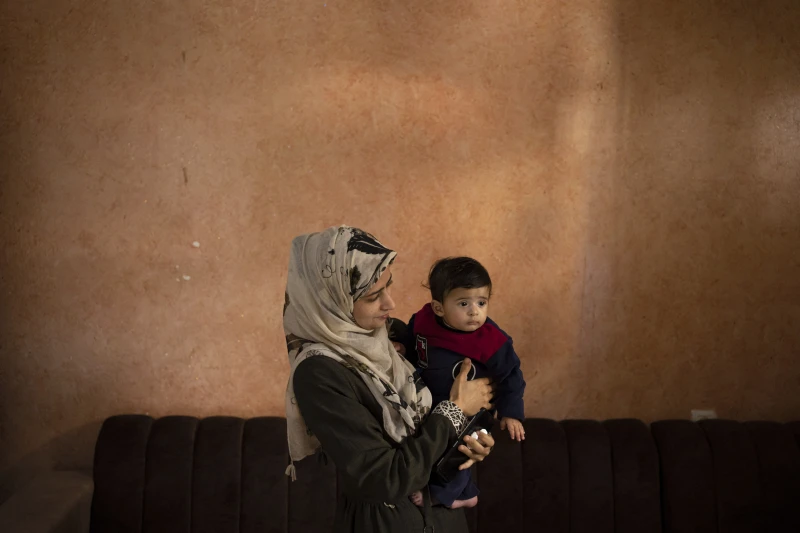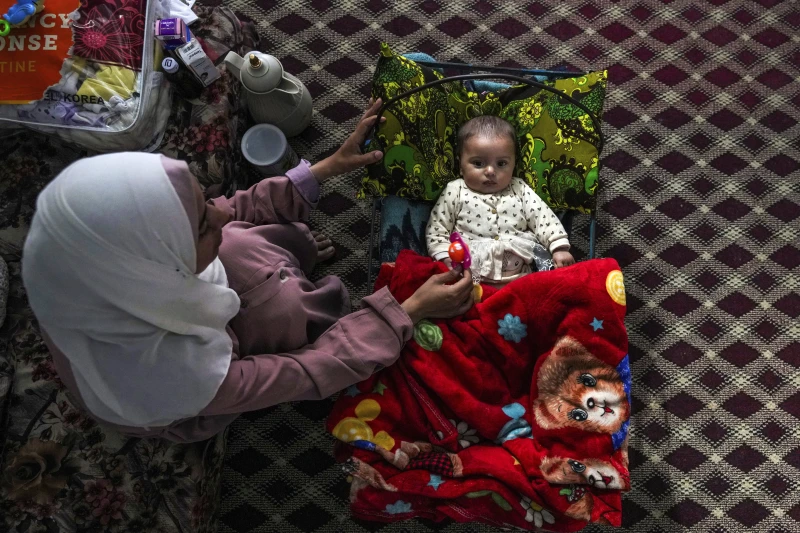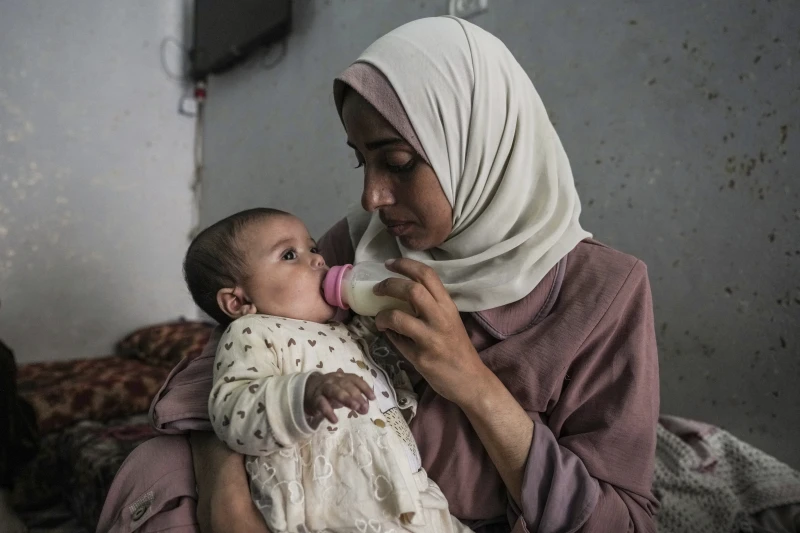The story of Amal Al-Taweel and Rola Saqer, two mothers from the Gaza Strip who gave birth to their long-awaited children amidst the chaos of war, is a poignant reminder of the harsh realities faced by families living in conflict zones.
The joy of bringing a new life into the world is juxtaposed with the harshness of their surroundings, where the sounds of explosions and the fear of airstrikes are a constant presence.
Amal and Mustafa’s journey to parenthood was marked by years of struggle and longing. The birth of their son Ali was a moment of triumph, a culmination of their hopes and dreams.
But as they held their newborn in their arms, the world around them was descending into chaos. The declaration of war by Israel brought with it a wave of violence and destruction, leaving their home in ruins and their future uncertain.
Similarly, Rola and Mohammed’s joy at the arrival of their daughter Masa was overshadowed by the harsh realities of war. As they sheltered from airstrikes, Rola went into labor, determined to bring their child into the world despite the danger all around them.
The name Masa, meaning diamond in Arabic, symbolizes the preciousness of life in the midst of adversity.
The challenges faced by these families in the aftermath of the war are immense. Their homes destroyed, their access to basic necessities limited, and their hopes for a better future shattered.
The simple act of providing food and shelter for their infants has become a daily struggle, overshadowed by the uncertainty of what tomorrow may bring.
Amidst the rubble and devastation, Amal and Rola cling to the hope that their children will have a better future.
They speak of the dreams they had for their children, the plans they made before the war turned their lives upside down. But now, all they can do is live day by day, unsure of what the future holds.
The story of Amal, Rola, and their children is a reminder of the resilience of the human spirit in the face of adversity.
Despite the hardships they face, they continue to care for their children, to nurture them and protect them as best they can. Theirs is a story of love and determination, of hope in the midst of despair.
As we read about their struggles, we are reminded of the fragility of life and the importance of compassion and understanding in times of crisis.

The children born amidst war deserve a future free from violence and fear, a future where their dreams can flourish and their potential can be realized. It is up to all of us to work towards a world where every child has the opportunity to thrive, regardless of the circumstances of their birth.
The Al-Taweel family’s journey from Nuseirat to Rafah paints a harrowing picture of the impact of conflict on innocent civilians.
The Al-Taweels, like many others, were forced to flee their homes multiple times in search of safety as violence escalated in Gaza.
The constant threat of airstrikes and ground incursions left them with no choice but to evacuate at a moment’s notice, leaving behind all their belongings and cherished possessions.
The stark reality of war stripped them of even the most basic necessities, pushing them to the brink of despair.
Amal Al-Taweel’s account of the evacuation order issued by Israeli authorities, giving residents a mere 10 minutes to leave their homes, underscores the sheer terror and chaos that engulfed their lives.
The frantic escape to find refuge with relatives in central Gaza, where multiple families crammed into small spaces, highlights the overcrowded and dire living conditions faced by displaced Palestinians.
The makeshift tent camps in Rafah, where the Al-Taweels sought shelter, became a temporary yet harsh reality filled with hardships and deprivation.
The Al-Taweel family’s struggle to provide for their newborn son, Ali, amidst the scarcity of essential items such as baby food, diapers, and clothes, paints a poignant picture of the hardships endured by displaced families.
Mustafa Al-Taweel’s relentless efforts to work and save for his son’s needs, only to face insurmountable challenges in Rafah, speak volumes about the resilience and determination of parents in the face of adversity.
The reliance on aid provided by organizations like the U.N. underscored the critical need for external assistance in meeting basic needs during times of crisis.
The heartbreaking account of Saqer and her daughter Masa’s ordeal in the Shaboura refugee camp sheds light on the extreme conditions faced by displaced families.
The lack of proper shelter, sanitation, and access to healthcare exacerbated their suffering, leading to grave consequences for Masa’s health.
Saqer’s desperate attempts to provide for her malnourished daughter, even resorting to selling aid packets for formula, epitomize the lengths to which parents go to protect their children in times of desperation.
The challenges faced by both families in accessing adequate medical care for their children in Gaza’s decimated health sector reflect the broader humanitarian crisis unfolding in the region.
The limited capacity of hospitals to provide essential services, compounded by shortages of fuel, medicine, and equipment, has left many families grappling with life-threatening conditions without proper treatment.
The anguish and uncertainty that pervade the families’ thoughts about the future mirror the deep-seated trauma and uncertainty that pervade the lives of countless Palestinians affected by conflict.
As the Al-Taweel and Saqer families navigate the precarious path ahead, their resilience and unwavering hope for a better future stand as a testament to the human spirit’s ability to endure and persevere in the face of unimaginable hardships.

The journey from Nuseirat to Rafah is not just a physical displacement but a profound emotional and psychological upheaval that leaves indelible scars on the lives of those who have endured the ravages of war.
Amidst the rubble and ruins, the voices of the Al-Taweel and Saqer families echo the collective cry for peace, justice, and a future free from the specter of violence and displacement.

